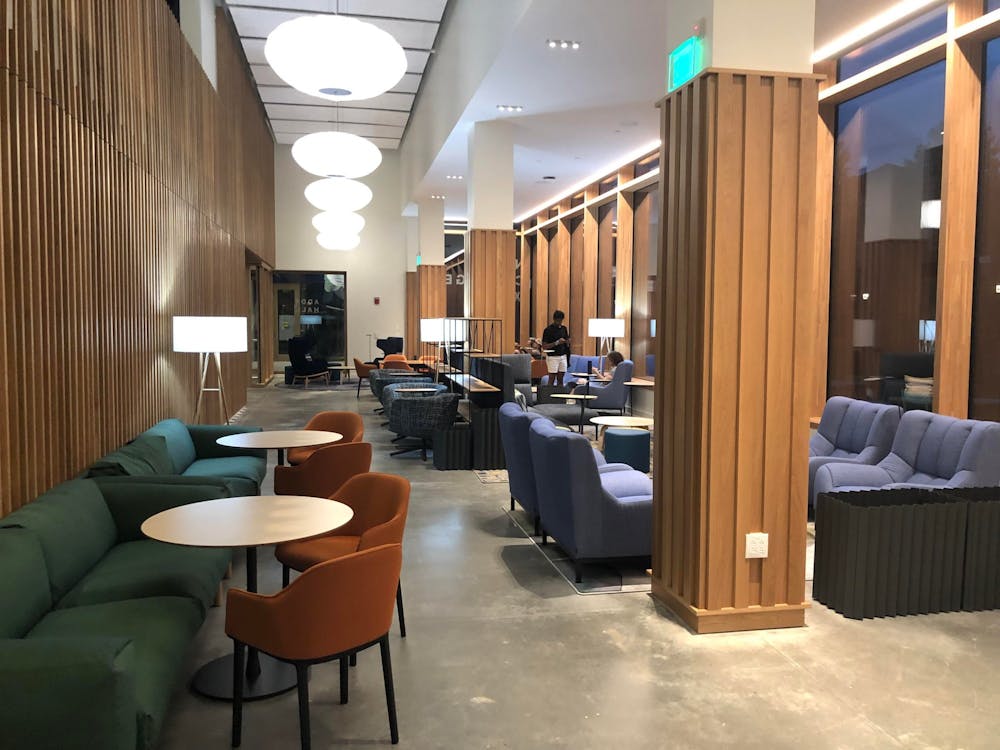Less than a week before many students were slated to return to campus, housing remained uncertain for some Yeh College and New College West (NCW) students, with about 20 percent of students in the two new residential colleges living in temporary housing, according to deputy University Spokesperson Michael Hotchkiss in an email to The Daily Princetonian on Aug. 30.
Although Hotchkiss told the ‘Prince’ that the University “expect[s] that about 90% or more of NCW and Yeh students” will be able to access their permanent housing assignments by move-in weekend, he also said that the approximately 20 percent of Yeh and NCW residents in temporary housing ahead of move-in day could rise to a little over 25 percent in the event that moves cannot commence on Sept. 3. This would place the number of students relocated from the new colleges at a minimum of around 160, with the possibility of rising to over 200 if rooms are not ready by Sept. 3, according to calculations done by the ‘Prince.’
These latest developments on Yeh and NCW move-in come after a string of email updates from administrators to the impacted students throughout the month of August. On Aug. 29, the University sent an email to undergraduates living in the two new colleges with new information regarding construction delays, which the University has previously said are the result of COVID-related supply chain issues.
With students from the classes of 2023, 2024, and 2025 slated to move in on Sept. 3, the email indicated that although the University was “optimistic” about the number of people who would be able to move in, “there remain[ed] a small possibility that something would delay [them] from opening these spaces” by that date. First-years have been in on-campus housing since Friday, Aug. 26.
Students who are assigned to temporary housing will receive assistance from professional movers, but will not have access to any on-campus storage facilities.
The Aug. 29 University email was sent to students in impacted areas, which Hotchkiss listed as Kwanza Jones, Grousbeck (ground level, floor 1, and floor 2), José E. Feliciano, and Mannion Halls. The email indicated that students in impacted areas scheduled to move in on Sept. 3 would receive an email on Sept. 2 indicating whether their room would be ready for their arrival. Students will live in temporary housing until notified otherwise — and it is not yet clear how long that wait will be.
Students currently in temporary housing who are able to move into their permanent assignments on Sept. 3 can do so, but must wait until Sept. 5 if they would like to do so with assistance from professional movers. Students in the Class of 2026 may move themselves in if their rooms become ready, but are not permitted to miss orientation events to do so.
Also on Aug. 29, the Undergraduate Student Government (USG) announced via email a new initiative to provide free box fans to students in rooms that are not air conditioned. Since many of the temporary housing assignments — particularly for first-years and Residential College Advisers (RCAs) — are part of the former First College, they are not air conditioned. Mariam Latif ’24, a class senator and co-chair of the USG Housing and Facilities Task Force said in an email to the ‘Prince’ that although the task force “advocated for all students to be eligible to apply for fans,” prioritization will be given to “students whose permanent room assignments are not air-cooled.”
It is unclear how long students may remain in temporary housing without air conditioning, and whether they will be eligible to receive cooling assistance during the hottest part of the University semester.
Jalynn Thompson ’24, told the ‘Prince’ that she was scheduled to move into Kwanza Jones Hall on Aug. 27, and an email sent a week prior indicated she would be able to move in as planned. On Aug. 26, she received an email that stated she would be placed in temporary housing — but she didn’t see the email until she was already on the way to campus the following day.
“I went to my temporary housing and it was on the fourth floor of upperclassmen housing,” Thompson wrote. “There was no elevator and it was very hot.”
After seeing her accommodations, Thompson and her parents decided that it would be best for her to commute to campus for the cheer practices she moved in for in the first place.

“I’m lucky enough that I only live 45 minutes away from campus,” she said.
Braiden Aaronson ’25 was also scheduled to move into Kwanza Jones Hall early, on Aug. 26. They, like Thompson, were not notified that they would not be able to move into their room until the afternoon of the day before they were scheduled to arrive.
Since then, Aaronson has been staying in temporary housing. He told the ‘Prince’ that he has not yet begun to unpack — “to make the move to my permanent housing as painless as possible,” they explained. “So, I am making the most of living out of two suitcases for the time being.”
“I have felt unsettled through this experience,” Aaronson wrote, “because I do not have an actual place to unpack and set-up for the semester quite yet, especially with the touch-and-go communications from a constantly shifting construction timeline.”
Despite the “stressful” nature of the situation, Aaronson commended the construction workers “for working as diligently as possible to make as many rooms available as fast as they can!”
Thompson said she was initially “upset” that her room wasn’t ready, but agreed “that everyone is working hard to complete all of the unfinished rooms for us.”
“I hope they finish soon,” she wrote.
Associate Podcast Editor Eden Teshome contributed reporting.
Hope Perry is the Head Podcast Editor at the ‘Prince’ who has covered USG, U.S. politics, and student activism. She can be reached at hperry@princeton.edu or on Twitter @hopemperry.








